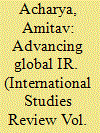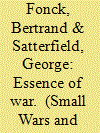|
|
|
Sort Order |
|
|
|
Items / Page
|
|
|
|
|
|
|
| Srl | Item |
| 1 |
ID:
145116


|
|
|
|
|
| Summary/Abstract |
This Presidential Issue, with contributions by scholars from Asia, Australia, the Middle East, South America, Africa, Europe, and the United States, illustrates how the idea of Global international relations (IR) could serve as a framework for both scholarly debate and empirical research and analysis. This issue is divided into two main parts. The first part contains nine feature articles that illustrate the multiple dimensions of a Global IR research agenda, overall demonstrating how bringing in non-Western ideas and agency broadens the horizons of existing IR knowledge. The topics covered here include Chinese conceptions of “relationality;” colonial interactions in the Indian Ocean to diffuse Westphalian sovereignty through processes of localization, comparing regionalisms, and norm dynamics in Asia and Europe; and the contribution of intercivilizational dialogues in bridging the West-Rest divide. Together, these articles challenge dominant understandings of these issues in current IR theory and highlight the place and agency of non-Western societies in the global order. The second part of the Presidential Issue, the Forum Section, contains ten short contributions that were drawn from two Presidential Theme Panels at the ISA 2015 Convention in New Orleans. These Forum essays not only highlight the obstacles facing the realization of Global IR, including some traditionalist objections to the whole idea, but also offer some pathways to overcome them. Overall, the Presidential Issue suggests that a Global IR is both possible and desirable.
|
|
|
|
|
|
|
|
|
|
|
|
|
|
|
|
| 2 |
ID:
133512


|
|
|
|
|
| Publication |
2014.
|
| Summary/Abstract |
In the late seventeenth century during the Dutch War (1672-1678) and the Nine Years War (1688-1697), French armies relied on small war for the accomplishment of essential tasks and as part of an overall strategy of exhausting their opponents in the Low Countries. The purposes of small war included the imposition of contributions on enemy populations, the destruction of the enemy base of operations, blockades of fortresses, and the general support of campaign armies. The expression 'small war' in the French language appeared with growing frequency in the 1690s. Small war can be viewed as both a cause and consequence of the characteristics of these wars. The limited policy goals of Louis XIV the king of France required a strategy that minimised risk and accomplished the goal of reducing if not eliminating the Spanish presence in the Low Countries that bordered the north of France. As French armies increased in size during this period, the demand for specialists at small increased in order to provide security and ensure supply. Small war in the late seventeenth century was thus not ideologically motivated insurgency, but in the minds of French commanders an essential component of strategy and the nature of war.
|
|
|
|
|
|
|
|
|
|
|
|
|
|
|
|
|
|
|
|
|